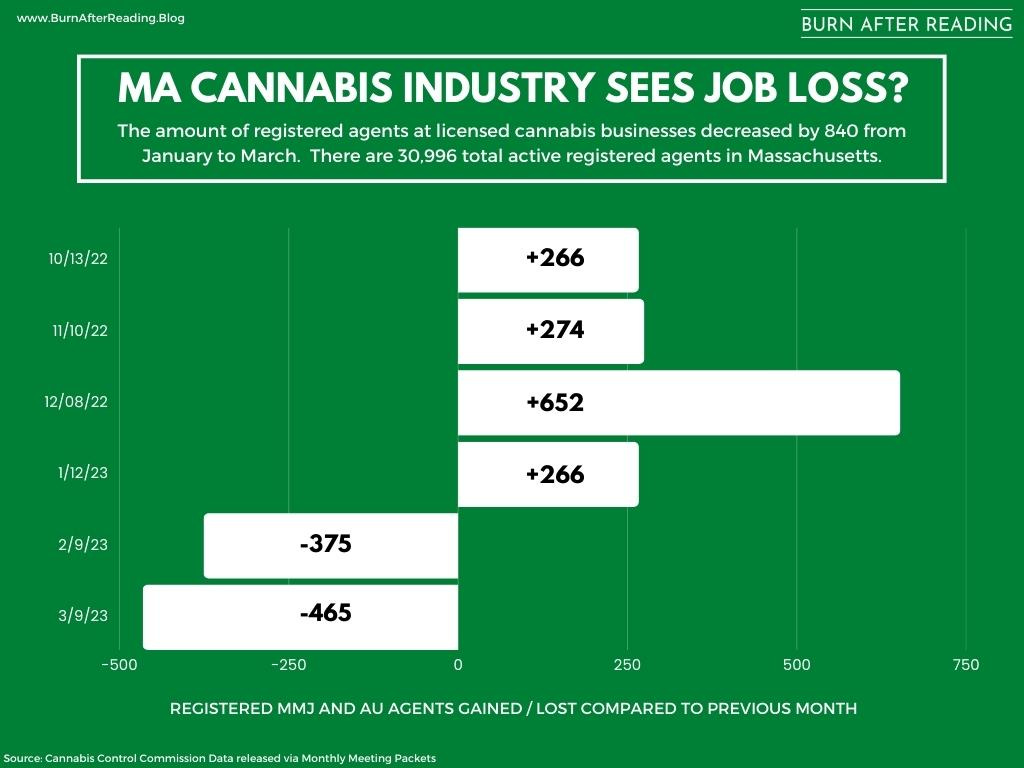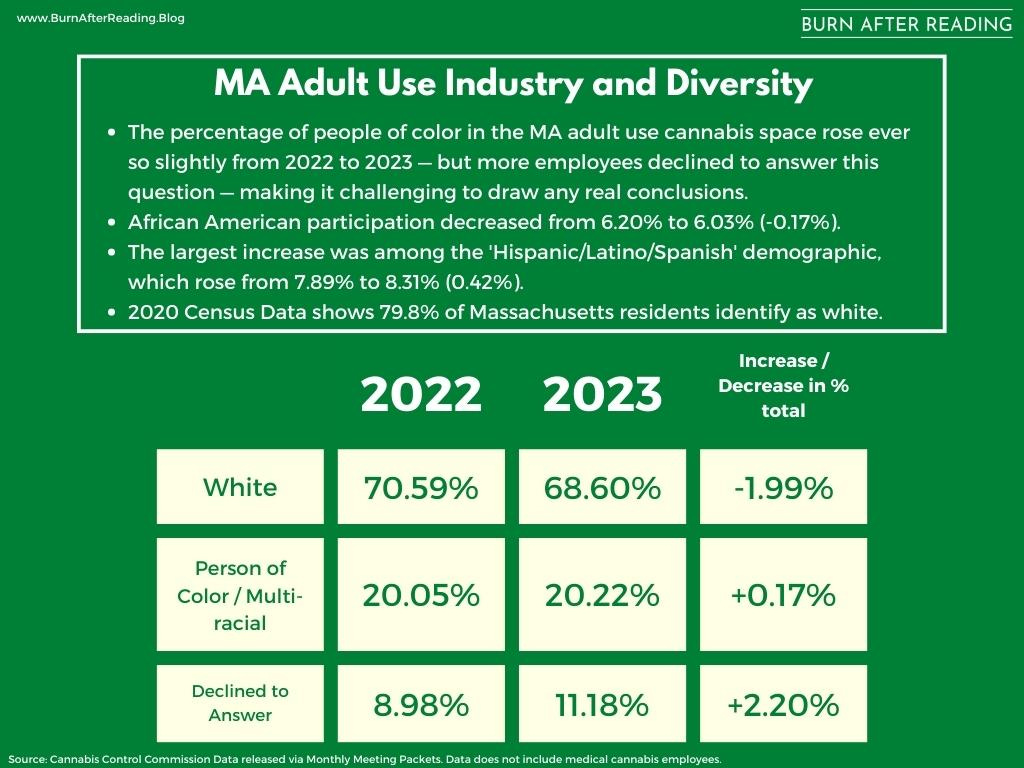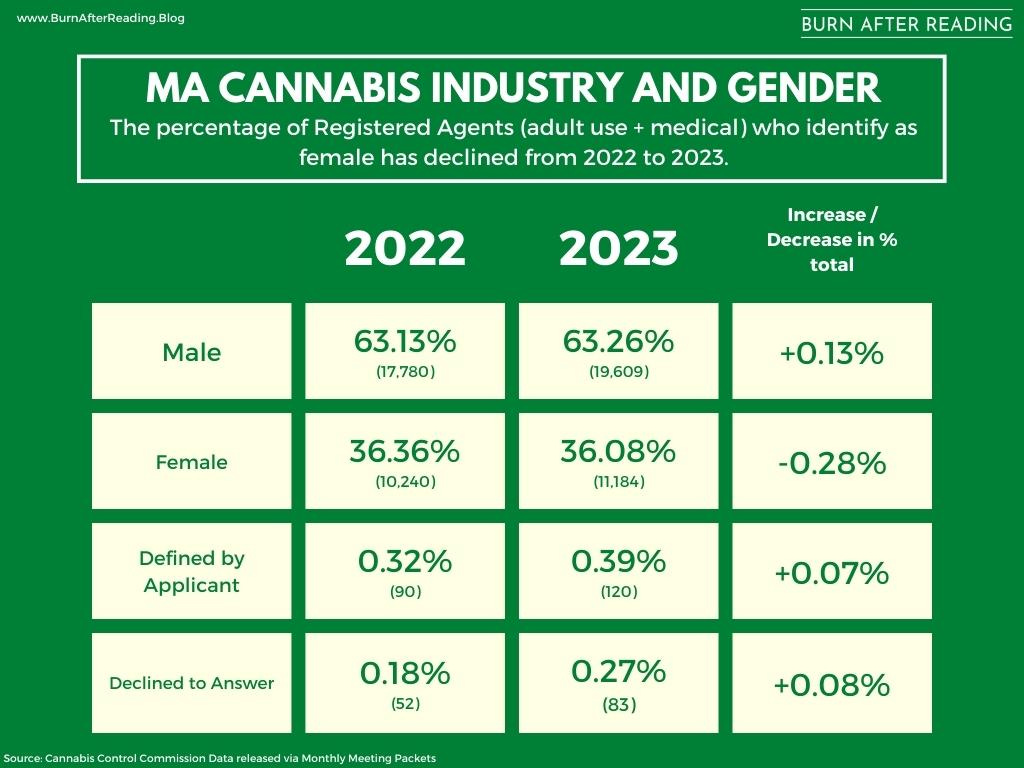Issue 36: A Wild Week as We Head into NECANN
My Oklahoma predictions fall flat, I share some data on MA industry diversity, Calvin Johnson Jr.'s company comes to Boston, and more.
Welcome to Issue #36 of Burn After Reading! You can check out last week’s issue here. If you haven’t subscribed already, you can do so here.
It was already set up to be an eventful week with NECANN in town, and that was before a massive story fell into my lap on Wednesday. Let’s get into it.
I Eat Crow Over My Oklahoma Prediction
Well this is awkward. Oklahoma’s ballot initiative fell well short, despite the fact that I predicted it would pass by 54% earlier in the week.(🔒) So what did I learn?
Don’t make predictions when you have no real data to work with. Emboldened by the relative success of my 2016 and 2020 cannabis election predictions, I thought I knew enough about cannabis initiatives to make some big assumptions about Oklahoma — a state I’ve never actually stepped foot in. I clearly underestimated the influence of Big Ag in state politics and the inability of Oklahoma voters to actually get out and vote. This is an ego check I probably needed, so I will go eat some humble pie with egg on my face.

Let’s all agree to never waste money on a legalization initiative outside of a major election again. Let’s face it, cannabis issues are not the most pressing concern on your average voter’s mind. This issue needs the progressive turnout boost we see in midterm and presidential elections, and simply does not bring out enough legalization supporters when cannabis is the only thing on the ballot. The fact that SQ820 failed in every single county is enough evidence for me to assume this would be true even in states beyond Oklahoma.
Cannabis can’t talk, making it a really effective scapegoat. The entire history of cannabis in America shows us that it’s been an incredibly effective fall guy for conservative politicians, and legalization doesn’t magically change that. Oklahoma’s leaders set up a medical cannabis program with no accountability over who was being given licenses, and then successfully blamed everyone and everything besides themselves when things started going belly up.
Is this what happens when you regulate cannabis “like tomatoes?” I too would like to live in a fantasy world where cannabis grows everywhere and there are no rules, but perhaps we should remember the fact that it’s is still a Schedule I drug with big street value in states where it’s still illegal. It’s unclear whether most of the blame should be pointed at Oklahoma’s rules, their lack of enforcement, or the lack of accountability towards regulators.. but it’s obvious the state has a problem. Even the libertarians are admitting it (from Politico):
Oklahoma libertarian legalization advocate Chip Paul argues that the problem isn’t the state’s unlimited licensing structure, but rather the failure of state regulators to establish sound guardrails and adequate enforcement.
“You can pretty much do whatever you want with no fear that you’re going to get inspected,” Paul said. “Our state is whistling Dixie and letting it all happen.”
I’m not going to take law enforcement’s claims about the involvement of organized crime in Oklahoma’s program at face value, but it’s clear from my perspective that there’s some truth to the idea that these forces are present in America’s more “wild” cannabis spaces in Oklahoma, California, and elsewhere.
The road towards federal legalization is winding. Prohibitionists just cleverly took advantage of various weaknesses in the legalization movement. They scored an impressive (but likely temporary) victory against the tide of the overall conflict by taking advantage of conditions on the ground and the overconfidence of legalization supporters. It’s a potent reminder that success is not linear, and this “fight” will never truly end. After all, some people are still fighting in favor of alcohol prohibition.
ICYMI: Updates on the Curaleaf situation in MA
This week, Grant Smith Ellis and I co-authored this article detailing communications within the CCC from December that indicate the scope of their investigation into Curaleaf:
Breaking: Internal Cannabis Control Commission (CCC) Communications Confirm Investigation into Curaleaf For Financial Ties To Sanctioned Russian Oligarch
MEGATRON COMES TO NEW ENGLAND
No, Calvin “Megatron” Johnson Jr. isn’t coming out of retirement to catch passes from Mac Jones. Instead, his company Primitiv Wellness announced on Thursday that it’s opening up a cannabis retail store at 200 High Street (lol) in Boston. In addition to Johnson Jr.’s usual partner in fellow NFL alum Rob Sims, he’s also teaming up with Haitian-born, former Boston College lineman Gosder Cherilus for this project. Cherilus briefly played alongside Megatron with the Detroit Lions in 2008.
I had a hunch that Megatron might be making moves in the Bay State as early as my November MJBiz Conference interview with him, and the later creation of a Boston-focused Primitiv instagram account confirmed this. Now we finally know what Johnson Jr.’s gameplan is and who his teammates are, and the trio have some ambitious diversity goals for this store: Their state application says they want to the store’s employees to be 70% minorities and 50% female.
When I get a chance to actually breathe in the next few weeks, I’ll dig around for some more specifics on this deal. Johnson Jr. is the rare experienced celebrity in the cannabis space who (as far as I’m aware) hasn’t “stepped in it” in one way or the other, so it will be interesting to see if he can continue to expand his burgeoning cannabis empire while maintaining his reputation.
How Agent Registration Demographics Are (and Aren’t) Changing
Why do I consider Primitiv’s diversity goals ambitious? Well let’s take a look at the numbers.
With the New England Cannabis Convention in town, the Massachusetts industry is getting a little bit more attention this week, so I figured it made sense to dive into the Commission’s registered agent data again and see how things have (or haven’t) changed.


HEADLINES
New England
BIG PAPI TAKES A SWING AT MAINE CANNABIS MARKET (Alexis Wells | Maine Business Journal): ”The partnership marks Papi Cannabis’ entry into the Maine market at the beginning of April, when Ortiz's line of cannabis products will be available at JAR Cannabis stores. The line was developed between Ortiz and Rev Brands, a Massachusetts retailer and wholesaler of cannabis products.”
CANNABIS BLACKOUT – HOW MAINE CLIPS ITS BIGGEST AGRICULTURAL CROP FROM ITS TOURISM PROFILE (Sam Pfeifle | Portland Phoenix): “The contrast with alcohol is stark. Search “beer” on the VisitMaine.org website, which the Maine Office of Tourism uses to inform tourists, and one finds dozens of articles, trip itineraries and events and business listings. “Wine” and “spirits” also yield many options. “Cannabis,” though? A blank white page. “Marijuana” produces a single listing for the United Farmers Market of Maine.”
RENEWED THC POTENCY PROPOSAL STIRS THE POT IN SENATE (Aubrey Weaver | VTDigger): “A bill in the committee, S.72, would remove the current statutory limit of 60% for concentrates sold in shops — products like hashish and oils and waxes that contain higher amounts of the chemical in cannabis that gets people high. The same no-limit policy was introduced last session as part of the cannabis omnibus bill, S.188, which further fleshed out regulations in Vermont’s fledgling recreational pot industry. But legislators then made a last-minute decision to impose a 60% limit on concentrates before Gov. Phil Scott signed the bill. That’s what sponsor Sen. Dick Sears, D-Bennington, wants to undo.”
Rest of U.S. / National
MICHIGAN CANNABIS COMPANY SKYMINT IN RECEIVERSHIP AFTER BEING SUED (Solomon Israel | MJBizDaily): “Michigan-based cannabis cultivator and retailer Skymint is in receivership after a Canadian investment firm filed a lawsuit claiming the company owes more than $127 million. According to Crain’s Detroit Business, Calgary, Alberta-based Tropics LP alleges that Green Peak Innovations, which operates as Skymint, generated $153 million less than what it forecast in 2022. The lawsuit, filed March 3, claims the company was spending $3 million per month. The suit also alleges that subsidiaries have borrowed more than $81 million from Tropics since 2021 and have been “chronically in default of their loan obligations,” the Lansing State Journal reported.”
HAWAII SENATE APPROVES MARIJUANA LEGALIZATION AND PSYCHEDELIC RESEARCH BILLS (Kyle Jaeger | Marijuana Moment): “The Hawaii Senate has approved a bill to legalize marijuana, and two psychedelics research measures, ahead of a key legislative deadline. And the House separately passed a companion to one of those psychedelics proposals. The Senate cannabis legalization bill, sponsored by Sen. Joy San Buenaventura (D), cleared the chamber in a 22-3 vote on Tuesday. Advocates are encouraged by the development, especially after a number of amendments were adopted in committee last week that tackled certain equity concerns with the bill as introduced.”
JAY-Z'S CANNABIS BRAND ACCUSED OF HARASSMENT, ILLEGAL SHIPMENTS OUT OF CALIF. (Lester Black | SF Gate): “Cathi Clay, a former vice president at The Parent Company (TPCO), a San Jose cannabis company that produces the Monogram brand, made the explosive allegations in a lawsuit last month. Clay alleges that TPCO executives harassed and discriminated against her because of her gender and then retaliated after she filed a whistleblower report regarding financial inaccuracies and violations of state cannabis regulations.”
International
🇬🇧 NHS LICENSED MEDICAL CANNABIS PRESCRIPTIONS GREW 45% LAST YEAR, BUT ‘SITUATION AS INTOLERABLE AS EVER’ (Ben Stevens | Business Cann): “Data gathered from NHS OpenPrescribing suggests that prescriptions for Nabilone, Sativex and Epidyolex, currently the only three cannabis medicines licensed by the NHS, rose by 45% between 2021 and 2022. This was an acceleration on the 14% growth seen in the prior year, and a significant improvement from the three relatively stagnant years of growth since 2018, when medical cannabis was officially made available in the UK.”
🇯🇲 LOCAL CANNABIS PLAYERS PEEVED (Erica Virtue |Jamaica Gleaner): “According to industry operators, the amounts being imported into Jamaica are commercial quantities, and seemingly not for research. There is no detail on the form of the imports, whether it is planting materials or finished products such as oils or buds, but the portfolio Minister Aubyn Hill said the total represents six, or seven strains that are not available in Jamaica.”
🇦🇬 GROW ANTIGUA: INSIDE THE COUNTRY’S FIRST MEDICAL CANNABIS DISPENSARY (Gemma Handy | Antigua Observer): ”Once approved, a patient in Antigua and Barbuda can buy up to two ounces of cannabis flower or 15 grams of extract per day – pretty generous by most standards. “It’s up to them how they choose to use it of course,” Leo concedes. “But we emphasize it’s for medical purposes and shouldn’t be abused.” All of the company’s produce is grown on its farm in Seatons which started operations 18 months ago. Grow Antigua is unique in that it’s a collaboration between private entrepreneurs, the government and local Rastafari communities.”
Welcome Distraction
This interview with ESPN analyst/personality Mina Kimes, where she discussed breaking barriers in sports media as both a woman and an Asian American.
Cat of the Week
Toyota, a chonky boy who’s currently available for adoption at Baypath Humane.
Special Bulletin
If you’re heading to NECANN this weekend, Jason and Karen Reposa’s event newsletter compiled a list of everything going on around the Conference.
That’s a wrap on this issue. Thanks for reading! If you have any suggestions or feedback, email me here. Be sure to subscribe if you haven’t already, and if you can afford to support my work, please consider a paid subscription.




